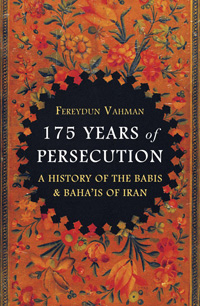For almost two centuries, followers of the Bahá’í Faith, Iran’s largest
religious minority, have been persecuted by the state. They have been made
scapegoats for the nation's ills, branded enemies of Islam and denounced as
foreign agents. Since the Islamic Revolution of 1979 Bahá’ís have been
barred from entering the nation's universities, more than two hundred have
been executed, and hundreds more imprisoned and tortured.
Now, however, Iran is at a turning point. A new generation has begun to
question how the Bahá’ís have been portrayed by the government and the
clergy, and called for them to be given equal rights as fellow citizens. In
documenting, for the first time, the plight of this religious community in
Iran since its inception, Fereydun Vahman also reveals the greater plight
of a nation aspiring to develop a modern identity built on respect for
diversity rather than hatred and self-deception.
“175 Years of Persecution offers a lucid academic account of the lives of the Baha'is under such intolerable conditions… This book is a must-read for all interested in modern Iran.”
- Mohamad Tavakoli-Targhi, Professor of History, University of Toronto
“Vahman, a very learned specialist in Iranian studies, offers a significant addition to our understanding of modern Iranian history… Important reading.”
- Roy Mottahedeh, Gurney Research Professor, Harvard University, and author of The Mantle of the Prophet
“Fereydun Vahman's book 175 Years of Persecution provides, in accessible narrative vignettes, a sweeping account of the persecution of Iran's Baha'i community. Many articles and reports have documented the persecutions, but usually focusing on a chronologically and geographically confined space, often with a clinical approach. However, like Dee Brown's Bury My Heart at Wounded Knee on the genocidal campaign against Native Americans, or James Allen's Without Sanctuary, a visual history of lynching in the American south, here we have a work that brings the human impact to the fore. Vahman weaves together a larger story from individual, mob, or state-sponsored acts of murder, arson, gravesite desecration, imprisonment, dismissal from jobs, deprivation of pensions and education, etc. In clear and readable prose suitable for students, activists, and the general public, this book memorably describes the beleaguerment of the Baha'i community in Iran since its inception and makes it clear why the situation of Baha'is has been described as a bellwether of the prospects for true political rights and civil society for the entire Iranian polity.”
- Franklin Lewis, Associate Professor of Persian Language & Literature, University of Chicago





175 Years...
I had long awaited this book. For the first time, in one place, one comprehensive account, the treatment of the Baha'is in Iran is presented fully. News reports in the west, beginning in the 1840s, give only occassional glimpses of what was going on in Persia, and very often given through the distorted lens of those doing the persecuting. This account makes the record clear. This book makes it impossible for anyone to claim that the Baha'i Faith was created by Great Britain, or Russia, or that we are agents of Zionism. None of which is true, but is nonetheless taken for granted, as obvious, by too many Iranians. Thank you, Fereydun Vahman!